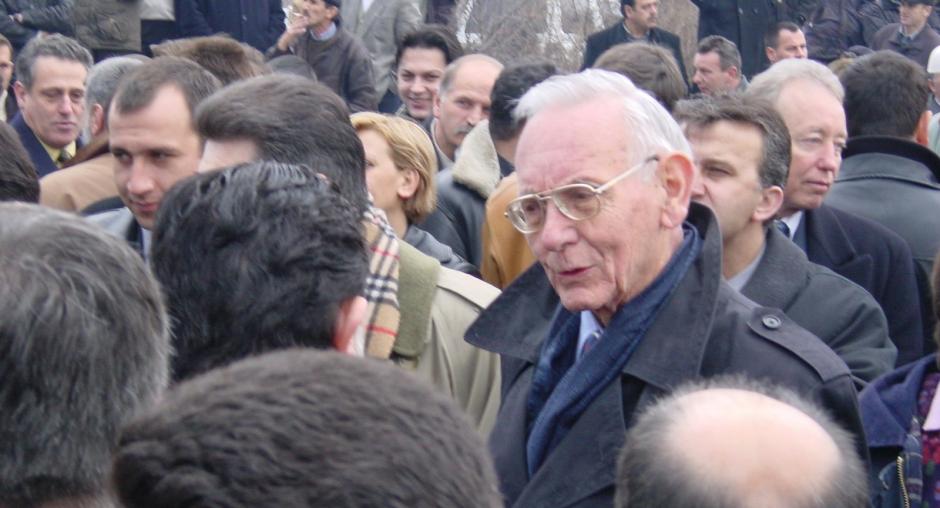Max van der Stoel: 1924-2011
At a special meeting of the Permanent Council, held in honour of Max van der Stoel (on 22 June 2001) during his final days as High Commissioner on National Minorities, Kai Eide, then Permanent Representative of Norway, said, “you belong to a generation of giants in international relations.”
Max was certainly a giant within the OSCE. He was one of the founding fathers of the Helsinki Final Act in 1975. He championed the Helsinki principles, particularly those relating to human rights. When he visited Czechoslovakia in March 1977, he was one of the first Western officials to meet with dissidents from Charta 77, including Jan Patocka and Vaclav Havel.
Max was certainly a giant within the OSCE.
Van der Stoel is best known in the OSCE as the first High Commissioner on National Minorities. The post was created through the Helsinki Decisions of July 1992. It was a reaction to outbreaks of inter-ethnic violence in the former Yugoslavia and concerns about tensions in some former Soviet republics. The High Commissioner’s mandate is to be an “instrument of conflict prevention at the earliest possible stage”.
Van der Stoel took up his duties on 1 January 1993 in a small office overlooking a canal in The Hague. He was well-qualified for the post, having been twice Minister for Foreign Affairs of The Netherlands, a long-serving Member of Parliament, a Member of the Parliamentary Assembly of the Council of Europe (where he, famously, was Rapporteur on Greece during the so-called colonels crisis, when massive human rights violations followed the establishment of a military dictatorship in 1967), and Permanent Representative of The Netherlands to the United Nations when they had a seat on the Security Council. He eventually became a Member of the Council of State and was named a Minister of State (an honorific position in service to the Queen of the Netherlands). On the basis of his strong track record on human rights, in 1991 van der Stoel was appointed to the high-profile role of United Nations special rapporteur on human rights in Iraq. He carried out this pro bono function for almost a decade, cataloguing Saddam Hussein’s systematic violations and crimes against the Iraqi people.
The early days as High Commissioner were characterized by learning by doing. Max (as he was known to most), together with a few seconded advisers and a secretary, started to take the temperature of inter-ethnic relations in the OSCE area, focusing on what he judged to be precarious situations, and where he could make a difference. He travelled extensively, particularly to Latvia and Estonia where tensions were acute.
From the beginning, he stressed the importance of discretion. His meetings were restricted, he seldom talked to the press, his recommendations were kept out of the public domain for some time, and his reports to the Chairperson-in-Office were strictly confidential. This won him the respect of his interlocutors and prevented sensitive issues from becoming sensationalized in the press. And it has become a hallmark of the High Commissioner’s approach ever since.
During a visit, Max would talk to all relevant parties. Indeed, he would pack in a full day of meetings, seldom stopping for lunch or other distractions. And then it was back on the plane: he wanted to be the first on and the first off, not to waste a moment. Even on long trips he never checked in his luggage (and had no patience for advisers who did).
Max was stubborn, and he was relentless. If a government was slow to follow-up on his recommendations, he would continue to write or visit until he was satisfied that the sources of tensions had been addressed.
Because certain issues like language, education, and participation in public life kept cropping up, he decided to ask groups of internationally-led experts to draft a series of recommendations. These became the Hague Recommendations Regarding the Education Rights of National Minorities, the Oslo Recommendations Regarding the Linguistic Rights of National Minorities and the Lund Recommendations on the Effective Participation of National Minorities in Public Life. Other general recommendations followed, expanding the normative framework within which such issues could be considered and peacefully managed – across the OSCE area and beyond.
The High Commissioner’s mandate says that he should provide “early warning” and, as appropriate, take “early action” in regard to tensions involving national minority issues. Van der Stoel turned this concept on its head: he took early action in order to avoid issuing a formal early warning. Indeed, in his more than eight years as High Commissioner, Van der Stoel only rang the alarm bell once, and that was on 12 May 1999 in relation to the potentially destabilizing influence of a large influx of Kosovar Albanian refugees into the former Yugoslav Republic of Macedonia. In fact, he visited the country more than fifty times during his term in office, worked hard to reduce tensions, was an architect of the Ohrid Agreement that ended the armed conflict in 2001, and was the founding father of the South East European University in Tetovo, which was built in order to promote greater integration and increase opportunities for higher education for the Albanian minority in Macedonia.
Max was recognized for his work with several honorary degrees and high honours, even from countries that didn’t enjoy his attentions at the time. The Nobel Peace Prize eluded him – although he was nominated for it several times. One reason, perhaps, is that it was hard to prove his success when nothing happened. But that was the point. As one observer put it, he kept the dogs from barking. And Europe can be grateful for that.

